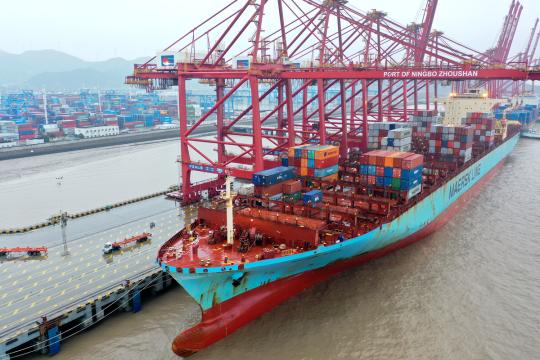
Maersk Sofia, a container ship currently sailing under the flag of Singapore, docks at the Dapukou container terminal of the Port of Ningbo Zhoushan in Zhejiang province on Feb 2. (Photo by YAO FENG/FOR CHINA DAILY)
China is likely to take a more proactive approach to align with high-standard international economic and trade rules, as well as to make more contributions to the formation of new international economic rules that reflect China's experiences, according to experts and business leaders.
Such efforts will not only expand market entry but also improve fair competition, to help with high-level global economic and trade cooperation and facilitate world economic recovery, they said.
They made the remarks as the country's opening-up push for the future is expected to be a hot topic during the upcoming two sessions, which are the annual meetings of the National People's Congress and the National Committee of the Chinese People's Political Consultative Conference.
"With changes in domestic and international situations, China must accelerate the alignment with high-standard international economic and trade rules, to establish a more transparent, fair and predictable business environment that levels the playing field for all market entities," said Huo Jianguo, vice-chairman of the China Society for World Trade Organization Studies.
Huo said more breakthroughs are required to achieve that purpose, especially in abolishing practices inconsistent with improving the business climate and advancing institutional innovations that are up to high-level international standards but also meet China's needs.
Lan Qingxin, a professor at the Academy of China Open Economy Studies of the University of International Business and Economics, said China is expected to expand market entry for foreign investors in the services sector, release a national negative list for trade in services, and further open up the financial sector.
The country will also likely take a more active role in the formation of new international rules for low carbon and promote reforms in global economic governance, said Lan, who is also president of UIBE's Yangtze Delta Region Trade Institute.
Zhou Mi, a senior researcher at the Chinese Academy of International Trade and Economic Cooperation, said China will likely accelerate its experiments in pilot free trade zones, and explore new rules in areas such as digital economy and high-level interconnection of infrastructure.
Bai Wenxi, chief economist at IPG China, expected China will enhance national treatment for foreign investors, reduce foreign ownership restrictions, and strengthen the role of FTZs as opening-up platforms.
Zheng Lei, chief economist at Glory Sun Financial Group, suggested China should strengthen trade and investment ties with developing countries and advance construction of the Belt and Road Initiative, while leveraging on geographic closeness between the Hong Kong Special Administrative Region and Shenzhen, Guangdong province, to experiment with reforms and institutional innovations in consideration of developed countries' practices in the Shenzhen special economic zone, before replicating such experiments in other places.
According to Enda Ryan, global senior vice-president of British multinational company Reckitt Group, the Chinese government's determination to intensify reform and opening-up is apparent, which encourages the provincial governments to continue improving policies and services to foreign investors, and even some instructive competition among the provinces.
"I am looking forward to the measures to promote international mutual acceptance in R&D data, product registration, and examinations of imported products at the upcoming two sessions," he said.
However, analysts stressed that expanding opening-up doesn't mean simply adopting foreign rules, regulations and standards without considering China's specific development stage and economic reality.
"The ultimate goal of opening-up is to better allocate resources to create more development dividends for enterprises and people at home and abroad, and a rush to openness will only lead to a waste of resources and damage to the environment," said Zhou, of CAITEC.